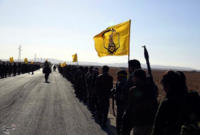
Photo from wikipedia
Abstract Since 2012, it is estimated that 2,000 French nationals have joined jihadist armed groups listed by the UN as terrorist organizations in Syria and in Iraq. Consequently, a new… Click to show full abstract
Abstract Since 2012, it is estimated that 2,000 French nationals have joined jihadist armed groups listed by the UN as terrorist organizations in Syria and in Iraq. Consequently, a new prosecution policy has been introduced in France. To date, more than 200 persons have been prosecuted and 1,600 persons have been placed under criminal investigation. In parallel, after the 13 November 2015 terror attacks in Paris, a State of emergency was declared. Persisting for two years, it introduced derogative administrative measures that slowly transgressed into regular criminal law. Consequently, French administrative and criminal courts, with ordinary judges and professional routines, find themselves involved in matters related to armed conflicts – a completely new phenomenon for them. What role has been performed by French criminal and administrative judges in the global fight against terrorism? This article takes a close look at France's fight against terrorism and the engagement of its domestic legal system in the context of foreign fighters and suspects of terrorism. It outlines the radicalization processes of French administrative and criminal law along with their hybridization and complementarity. While the armed conflict in Syria and Iraq and the complex geopolitical context are clearly present in French courtrooms, international humanitarian law and international criminal law frameworks are almost entirely absent. At the same time, by granting a growing power to the administration, the repressive and pre-emptive approaches introduced within criminal and administrative law transform liberal conceptions of law and justice.
Journal Title: International Review of the Red Cross
Year Published: 2018
Link to full text (if available)
Share on Social Media: Sign Up to like & get
recommendations!